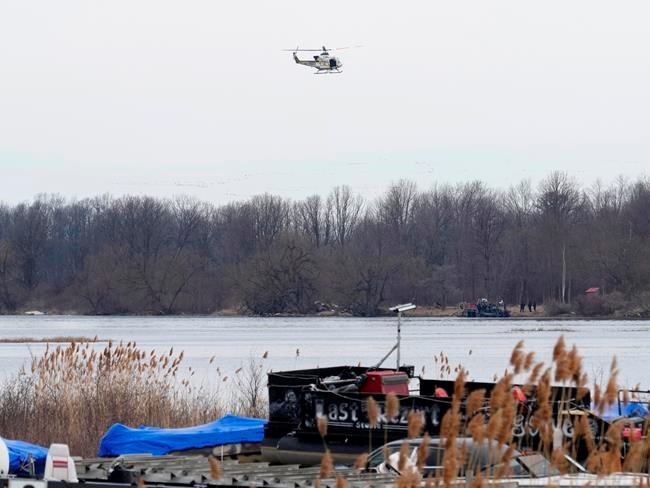MONTREAL — Federal prosecutors in the United States say an Indian man living in Canada was paid thousands of dollars to smuggle other Indian nationals into the U.S. through the Akwesasne Mohawk reserve.
Simranjit (Shally) Singh, 40, appeared in an Albany, N.Y., court Friday to face six counts of alien smuggling for profit and three counts of conspiracy to commit alien smuggling for profit, a day after he was extradited from Canada.
The case is not connected to the deaths last week of eight people — including four Indian nationals — who were attempting to illegally cross into the United States from Canada through Akwesasne, about 130 kilometres southwest of Montreal. But it sheds light on alleged human smuggling through the Mohawk territory straddling the Canada-U.S. border, where police say they have intercepted 80 people — mostly of Indian and Romanian descent — trying to enter the United States illegally since January.
A statement from the U.S. attorney's office for the Northern District of New York says the charges stem from Singh's "involvement and facilitation of the smuggling of Indian nationals from Canada into the United States, via Cornwall Island and the Akwesasne Mohawk Indian reservation in the St. Lawrence River region, from at least March 2020 through March 2021."
U.S. prosecutors filed an indictment against him in June 2022 alleging that during three separate trips, Singh smuggled six people across the border.
Singh, who lived in Brampton, Ont., is accused of being a "broker" who was paid by migrants to organize their travel across the border, according to court documents filed in Ontario as part of the extradition process.
In an Aug. 10 Ontario Superior Court ruling denying Singh bail, Justice James Stribopoulos said the accused is alleged to have transported migrants to Cornwall, Ont., which is next to Akwesasne. From there, "he introduced them to 'transporters' he recruited and paid, who, in turn, smuggled them across the St. Lawrence River and into the United States."
The Ontario ruling says one migrant who was arrested by U.S. authorities reported paying Singh $35,000 to bring him across the border, while U.S. authorities told the court that others paid as much as $14,000.
A migrant who was arrested by U.S. authorities and who identified Singh from a photograph "reported that his family in India paid Mr. Singh to smuggle him into the United States," Stribopoulos's ruling says. "During their drive to Cornwall, he claimed, Mr. Singh told him he had no reason to worry and boasted that he had smuggled 'over 1,000' people into the United States."
"The materials filed suggest Mr. Singh has led a scheme to smuggle unlawful migrants into the United States for over two years. And he has persisted in doing so even after the arrest of some of his subordinates in the scheme," Stribopoulos says. "Moreover, given the information concerning what he charges the unlawful migrants and what he pays the transporters, Mr. Singh appears to have earned substantial sums of money from this illegal enterprise."
The ruling says a transporter who testified as part of the investigation said Singh paid him between $2,000 and $3,000 for every migrant he took across the border.
Singh had been living in Canada since December 2010 but was subject to a removal order after a 2011 refugee claim was refused. He is next scheduled to appear in court in New York state on April 7.
Akwesasne is known for being a transit point for the trafficking of humans and contraband because of its location, and in February, police there reported an increase in human smuggling through the territory.
Last week, Mohawk leaders lamented how their community is often exploited by human trafficking networks after the bodies of eight migrants, including two children, were pulled from the St. Lawrence River. Akwesasne Mohawk police Chief Shawn Dulude told reporters that criminal networks often exploit young people in the community who are looking to make money.
These networks, Dulude said, know they can "facilitate and find people in our community, that are to a certain extent exploited because of their knowledge of the waters and the lay of the land — that they can get people into the United States.''
Mohawk police say a missing Akwesasne man is linked to the discovery of the eight victims whose bodies were found in the river on Thursday and Friday. A small boat belonging to Casey Oakes, 30, was located next to the migrants' bodies. He was last seen operating the boat the night of March 29 and was reported missing the next day.
On Wednesday, Akwesasne police said they are continuing to search for Oakes with the help of other police forces, including the RCMP.
"Investigators now believe Casey Oakes was connected to the eight deceased victims recovered from the water last week," the Akwesasne Mohawk Police said in a news release. "An essential part of this investigation is determining whether or not this travel was facilitated by an individual or individuals."
This report by The Canadian Press was first published April 5, 2023.
Jacob Serebrin, The Canadian Press




